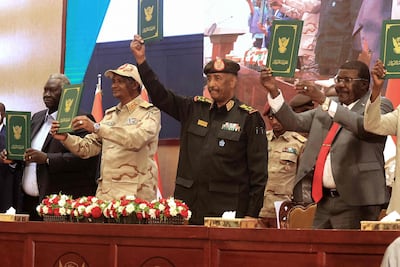Follow the latest news from the Sudan crisis here
Sudan's military and paramilitary forces are refusing to negotiate to end deadly fighting in Khartoum, former civilian prime minister Abdalla Hamdok said on Sunday evening.
At least 97 civilians have been killed and 365 injured in the clashes, the country's doctors' association said early on Monday.
Fighting erupted on Saturday between Sudanese Army units loyal to Gen Abdel Fattah Al Burhan, head of Sudan's transitional governing Sovereign Council, and the paramilitary Rapid Support Forces, led by Gen Mohamed Dagalo ― known as Hemedti — who is deputy head of the council.
Speaking in Abu Dhabi, Mr Hamdok, former leader of the non-military arm of Sudan’s transitional government, said the country was at a “catastrophic” moment, but he was still optimistic about a peaceful resolution.
The sides have become increasingly opposed in the role of the military and armed groups in post-transition Sudan.
Many civilians who led the mass uprising to end the more than 25-year rule of Omar Al Bashir in 2019 claim Gen Dagalo’s support is political rather than based on convictions.

“I appealed to the warring sides and said that the winner of this war is a loser. I appealed to the international community to help Sudan in this plight,” said Mr Hamdok.
“The war needs to end tomorrow to allow the country to move into the transitional period which began three years ago. Peace is the only valid option for the people to avoid slipping into civil war,” he said.
He said that he had spoken to both the military and the RSF “in long talks” before fighting started and “told them to keep the option for dialogue open. They both said dialogue isn’t an option for them.
“Now I’m finding it hard to communicate with them but I’m going to exert the maximum efforts to reach the people around them. I’m still optimistic, I’m a born optimist. No matter how grim things seem there’s still a chance for sitting down and resolving issues.”
The World Health Organisation said late on Sunday it urged all parties to “respect the neutrality of health care and ensure unrestricted access to health facilities for those injured by the hostilities”.
“WHO is monitoring the health needs and resources across Khartoum and other affected cities to ensure that limited supplies are directed to where they are most needed,” it said.
The organisation said supplies it had distributed to health facilities before the escalation were now exhausted and many of Khartoum’s nine hospitals taking in injured civilians were reporting shortages of blood, transfusion equipment, and medical supplies, as well as medical personnel.
“Water and power cuts are affecting the functionality of health facilities, and shortages of fuel for hospital generators are also being reported,” it said.
UN Secretary General Antonio Guterres reminded all sides of their obligations to international law. He said that as well as the three staff members of the World Food Programme killed in North Darfur, there were two seriously injured and there had been looting and shelling of aid in locations around the country.
The UN said Mr Guterres “reiterates his call for the immediate halt to the fighting and for a return to dialogue. He continues to engage with regional leaders and with Sudanese stakeholders to find a way out of this crisis.”
His comments came as Kenyan President William Ruto's office said the Regional African bloc Intergovernmental Authority on Development plans to send the presidents of Kenya, South Sudan and Djibouti as soon as possible to reconcile the conflicting Sudanese groups.
The UAE and Saudi Arabia have also called for calm.

Speaking to The National following his address, Mr Hamdok said that he had had assurances that Abu Dhabi and Riyadh support the push to appoint a civilian government in Sudan.
He said that the “catastrophic situation” in Sudan does not mean that a power-sharing framework agreement reached between civilian and military factions for a phased transition to democratic elections and civilian rule was dead.
RSF forces seized key infrastructure and locations around Khartoum on Saturday, but the military appeared to have the upper hand as fighting raged into Sunday.
State TV went off-air with Reuters quoting employees saying it had been cut to prevent Gen Dagalo’s forces from broadcasting.
The fighting sparked an international outcry and regional concern, including border closures by neighbours Egypt and Chad.
Explosions and gunfire rattled buildings in the capital Khartoum's densely-populated northern and southern suburbs as tanks rumbled on the streets and fighter jets roared overhead, witnesses said.












































